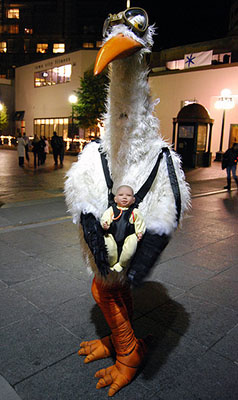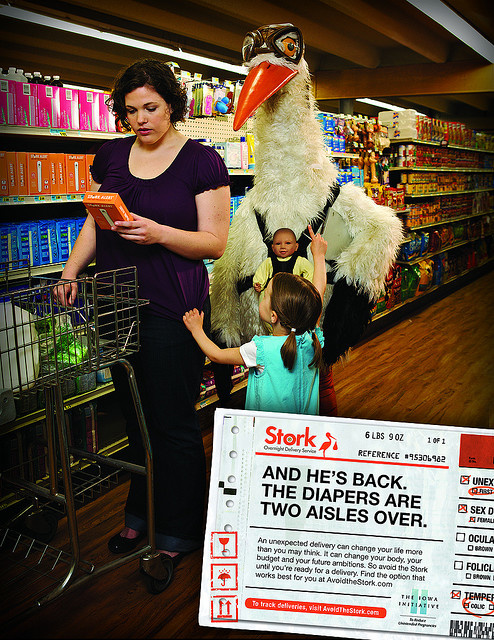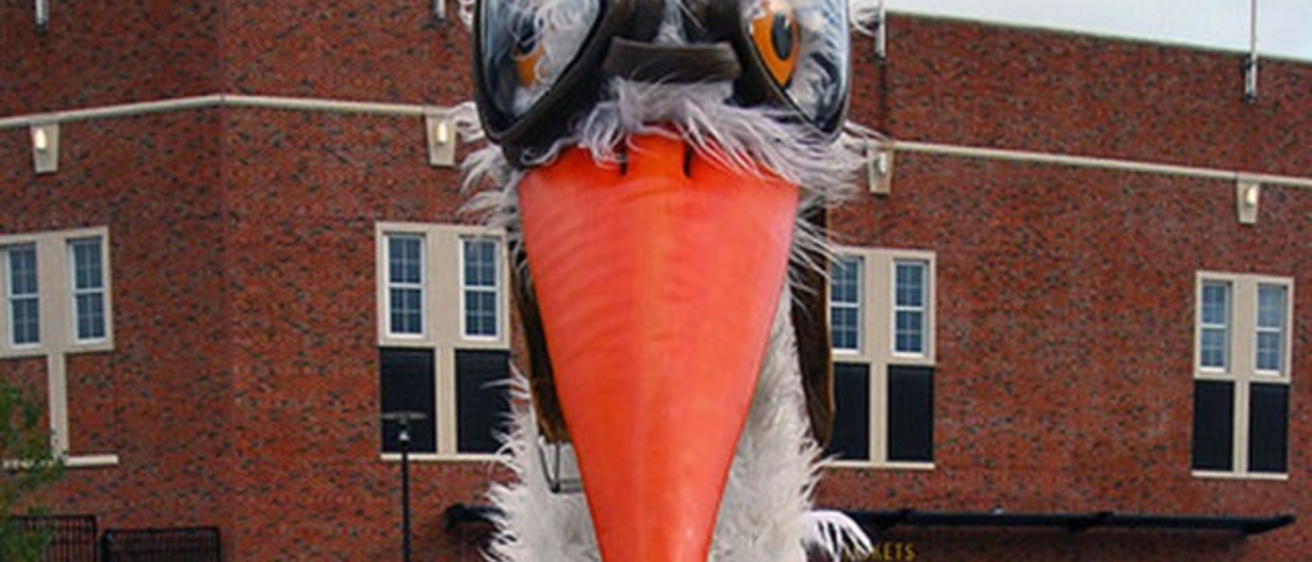It’s easy to tune out a lot of things, but when a 7-foot-tall white stork with a bright orange beak, oversized feet, aviator goggles, and plastic baby strapped to its chest appears at a football game, bar, or on TV—that’s hard to ignore.
Most of us are familiar with the fairy tale version of the stork who delivers neatly bundled babies to doorsteps. Researchers at the University of Iowa gave the story book stork a new twist by placing it at the center of a comprehensive social marketing campaign designed to prevent unintended pregnancies. The project was called Until You’re Ready, AvoidtheStork.com.
University of Iowa associate professor Shelly Campo and colleagues will present "On the Results" Thursday, Sept. 27, from 10 a.m. to 3 p.m. at the Iowa Events Center, Hy-Vee Hall, 730 Third St. in Des Moines, in Rooms 105-106.
For more information, call Deb Madison-Levi, The Iowa Initiative Director of Operations and Communications, at 515-282-5375.
The campaign was part of the research arm of the Iowa Initiative, a program that aims to reduce the high rate of unintended pregnancies among Iowa women ages 18-30 through networking, research, and public outreach.
The research program, conducted in conjunction with the University of Northern Iowa, University of Iowa, and the University of Alabama-Birmingham, included five studies designed to increase knowledge, persuade adult women to seek and access contraception if they wish to delay or prevent pregnancy, and improve family planning behaviors.
A stork is born
The stork concept was hatched by researchers in the Center for Health Communication and Social Marketing in the UI College of Public Health with the help of Worldways Social Marketing in Denver, Colo. The campaign is framed around the fictional Stork Overnight Delivery Services, “the nation’s leader in shipping and handling of life’s little bundles of joy.”

The Stork, decked out in flight regalia and harness for carrying a pint-sized passenger, is the constant, recognizable character that runs throughout the campaign. Always silent, the stork has the uncanny ability to appear at awkward, ill-timed moments to announce his special delivery.
Shelly Campo, a UI associate professor of community and behavioral health, and her colleagues, including Mary Losch, professor of psychology at the University of Northern Iowa, began gathering formative research for the campaign in 2007. They conducted surveys, focus groups, and in-depth interviews to gain information about people’s attitudes, knowledge, and behaviors regarding family planning.
“This is a humor-based campaign,” says Campo, who led the study. “This goes back to the fact that 18- to 30-year-olds don’t want to be preached at or judged. They wanted the information in a way that wasn’t condescending or judgmental. In developing the humor aspect, we had to be really careful that the target of the humor was the situation or the Stork, not the couple or the individuals who were receiving the delivery.”
The campaign was intentionally comprehensive, says Campo. “We’re addressing a wide range of women, from single women age 18 to married couples in their late 20s who already have children,” she says. “We reflected the spectrum of people’s circumstances and provided information about the many choices that are available.”Based on these findings, the team determined the consistent message of the campaign: “There is a birth control method that is right for you, your body, your budget, and your lifestyle. You must use birth control appropriately and consistently every time unless you are 100 percent sure you want to be pregnant.”
Creating buzz
The stork campaign was first pilot-tested in northwestern Iowa from June through August 2009. Results showed the campaign was headed in the right direction, so the Stork went statewide from June 2010 to August 2011.

And it went big—TV spots, radio ads, billboards, a website, posters, print and web ads, table tents, coasters, napkins, coffee cup sleeves, and other promotions were rolled out along with giveaways, including condoms, T-shirts, cups, lip balm, magnets, and stickers.
The Stork also made appearances at campus and community events throughout Iowa, including the Iowa Speedway, athletic events, RAGBRAI, county fairs, BBQ cook-offs, and music venues.
“We reached all 99 counties in Iowa,” Campo says. “It really created a lot of buzz and got conversations going.”
Campo and colleagues will first present results from the study on Sept. 27 at an Iowa Initiative event in Des Moines, where findings from the research projects will be highlighted. Additional results will be released in late October at the American Public Health Association’s annual meeting.
The Stork is currently on hiatus and no longer making personal appearances.
